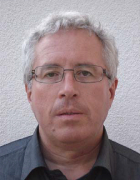
Prof. Dr. Hubert Kroha
Academic Career and Research Areas
Professor Kroha works and teaches in the field of experimental particle physics at high-energy accelerators. The current focus is on the study of the properties of the Higgs boson and the search for new particles and interactions with the ATLAS experiment at the Large Hadron Collider. A highlight of his research was the discovery of the Higgs boson in 2012. Furthermore, he develops new concepts and detectors for particle physics experiments and leads the construction of new muon detectors for ATLAS.
Professor Kroha (*1958) studied physics and earned his PhD at TUM. He worked at the accelerator centers of DESY and the Cornell University as well as with the experiments ALEPH and ATLAS at CERN. After a research stay in the US, he accepted in 1992 the project leader position for the development of the ATLAS detector at the LHC at the Max-Planck-Institute for Physics in Munich. He habilitated at TUM in 1997. In addition to the ATLAS data analysis, he works on the development and construction of detectors for new accelerators.
Key Publications
Bauer F et al.: "Construction and Test of the Precision Drift Chambers for the ATLAS Muon Spectrometer", IEEE Trans. Nucl. Sci., Vol. 48, No. 3 (2001) 302.
AbstractATLAS Collaboration, Aad G et al., "Observation of a new particle in the search for the Standard Model Higgs boson with the ATLAS detector at the LHC", Phys. Lett. B716 (2012) 1.
AbstractATLAS Collaboration, Aad G et al.: "Evidence for the Higgs-boson Yukawa coupling to tau leptons with the ATLAS detector", JHEP 04 (2015) 117.
AbstractKroha H, Fakhroutdinov R, Kortner O, Kozhin A, Schmidt-Sommerfeld K, Takasugi E: "New High-Precision Drift Tube Chambers for the ATLAS Muon Spectrometer", J. Instr. 12 (2017) C06007.
AbstractATLAS Collaboration, Aad G et al.: "Search for supersymmetry in events with four or more charged leptons in 139 fb−1 of √s = 13 TeV pp collisions with the ATLAS detector", JHEP 07 (2021) 167.
AbstractIf you wish your profile to be changed or updated please contact Franz Langer.